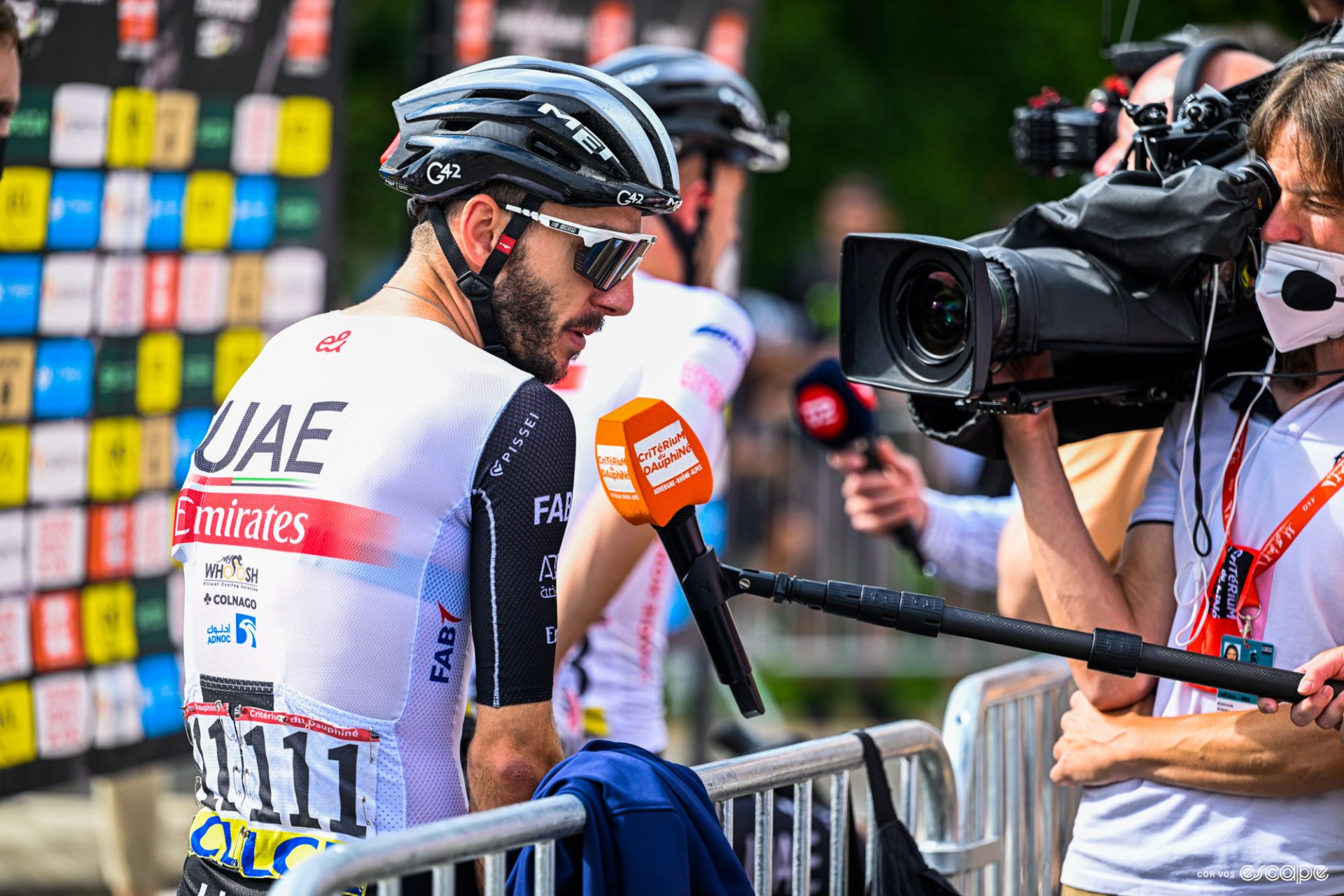Co-leadership at the Tour de France for UAE Team Emirates wasn’t part of the plan last winter, because when your Plan A is Tadej Pogačar, any Plan B feels somewhat superfluous. But broken wrists have a way of forcing things in a new direction. Adam Yates, hired from Ineos this year to be a prestige domestique in an increasingly potent UAE lineup, is officially co-leader this July.
The tactical shift has a host of benefits for UAE in their newfound role as challengers to the title. Not least of those benefits is the continuation of a narrative that suits UAE and Pogačar quite well: that he’s the underdog this July.
As Plan B’s go, Yates is not a bad one. He was 9th at last year’s Tour and has finished as high as 4th at the Tour and the Vuelta a Espana. Two weeks ago, he was the closest anybody came to Jonas Vingegaard at the Dauphine, even if that wasn’t particularly close.
Speaking with l’Equipe, UAE general manager Mauro Gianetti confirmed the setup. “Yates will not only be supporting Tadej; he will be our co-leader this summer,” he said.
The announcement that Yates will be more than a super domestique is part of an ongoing campaign to play down Pogačar’s chances. It is working. The bookies rate Vingegaard higher than Pogačar, and most of my discussions with in-the-know types this week have resulted in a similar statement: Vingegaard really is the favorite.
Gianetti pushed that narrative with l’Equipe:
“We don’t really have a choice,” he said. “Tadej went five weeks without being able to train on the road. There are no miracles in cycling: you have to put in the kilometers, the volume. He has worked well, he has confidence in himself, but we are not sure about anything. Certainly, he won the Slovenian championships easily last weekend, but that doesn’t mean he will be 100% ready at the start on Saturday.”
Pogačar, speaking with journalists including Escape Collective’s Kate Wagner at the Tour of Slovenia, provided measured responses to the ‘How has preparation been going? question. He also made sure to point out it hasn’t been perfect. “I haven’t been racing since the Ardennes, I’ve been injured and other guys from the Dauphiné who are the main competition [for the Tour] couldn’t follow Jonas,” he said. “So everybody will just expect him to win the Tour easily.”
These are not disingenuous explanations of where Pogačar stands. They’re true. They are also quite useful in moving the pressure center elsewhere as the Tour de France kicks off.
In addition to removing a bit of pressure from Pogačar’s shoulders and dumping it straight on those of Vingegaard, UAE’s two-pronged attack makes tactical sense. That’s particularly true this year, given the makeup of the difficult first week.
There’s little reason not to let Yates ride like the GC favorite he’s been for nearly a decade, at least at first. There is no likely downside. There are few scenarios in the first ten stages in which having Yates play domestique adds much to the team’s overall strength.
Yates staying close ensures that Pogačar will have another rider around across lumpy stages that could be chaotic if the peloton races hard. The onus for control will fall on whichever team takes yellow on stage 1, or on Jumbo-Visma, if those two aren’t the same thing. And if Yates can stay in contact with the leading duo, it does open up options across the heinous days in the Alps. UAE know this well given Primoz Roglič’s importance to Vingegaard last year, and now a similar tactic is potentially available to them.
There is little danger of a Movistar-like ineffective fork tactic, since the failure of those efforts usually came in the team’s lack of any leader who could truly challenge. UAE, in Pogačar, do not have that problem.
It feels a bit ridiculous to classify second place at the Dauphiné as a long-shot, but that’s where the sport is right now (Yates was 2:23 off Vingegaard’s winning time there, while the gap from Yates to fourth-placed Ben O’Connor was just 53 seconds). Given how comprehensively Vingegaard overhauled Yates at the Dauphiné, a true dual-leader strategy is incredibly optimistic.
So the real question, of course, is whether any of Pogačar’s rivals – chiefly Vingegaard – put any faith in the narrative UAE is consciously embracing. In reality, Yates is a backup, not a co-leader. But there’s just enough question around Pogačar’s form that, in the pressure cooker of the first week of the Tour, Yates is also a useful diversion.
Did we do a good job with this story?

